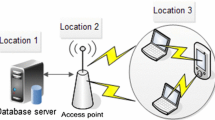Abstract
The caching of frequently accessed data items on the client side is an effective technique to improve performance in a mobile environment. Caching data in a wireless mobile computer can significantly reduce the bandwidth requirement. However, cache content needs to be validated; classical cache invalidation strategies are not suitable for mobile environments due to the disconnection frequency and mobility of the mobile clients. Attractive cache invalidation techniques are based on invalidation reports (IRs). But, IR-based cache invalidation schemes result in considerable consumption of uplink and download bandwidth. In this paper, we address these problems by presenting a new energy-efficient cache invalidation method for the wireless mobile environment. The new cache invalidation scheme is called Adaptive Energy Efficient Cache Invalidation Scheme (AEECIS). The algorithm is adaptive since it changes the data dissemination strategy based on the current conditions. To reduce the bandwidth requirement, the server transmits in one of three modes: slow, fast or super-fast. The mode is selected based on thresholds specified for time and the number of clients requesting updated objects. An efficient implementation of AEECIS is presented and simulations have been carried out to evaluate its caching effectiveness. The results demonstrate that it can substantially improve mobile caching by reducing the communication bandwidth (thus energy consumption) for query processing. Also, the reported results demonstrate that compared to previous IR-based schemes, AEECIS can significantly improve the bandwidth consumption and the number of uplink requests.
Similar content being viewed by others
References
Kang, H., & Lim, S. (2001). Bandwidth-Conserving Cache Validation Schemes in a Mobile Database System. Proceedings of the International Conference on Mobile Data Management, 121–132.
Lee, S. K., Hwang, C. S., & Yu, H. C. (1999). Supporting Transactional Cache Consistency in Mobile Database Systems. Proceedings of ACM MobiDE, Seattle, WA.
Li, D., & Cheriton, R. (1999). Scalable Web Caching of Frequently Updated Objects Using Reliable Multicast. Proceedings of USENIX Symposium on Internet Technologies and Systems, 1–12.
Rappaport, T. S. (1996). Wireless comm.: Principles and practice. Prentice Hall.
Shen, H., Kumar, M., Das, S. K., & Wang, Z. (2004). Energy-Efficient Data Caching and Prefetching for Mobile Devices Based on Utility. Proceedings of the International Parallel and Distributed Processing Symposium, Santa Fe, New Mexico.
Yeung, M. K. H., & Kwok, Y. (2005). Wireless cache invalidation schemes with link adaptation and downlink traffic. IEEE Transactions on Mobile Computing, 4(1), 68–83.
Yin, L., Cao, G., & Cai, Y. (2003). A Generalized Target-Driven Cache Replacement Policy for Mobile Environments. Proceedings of the International Symposium on Applications and the Internet (SAINT), 14–21.
Yu, H., Breslau, L., & Shenker, S. (1999). A Scalable Web Cache Consistency Architecture. Proc of ACM SIGCOMM, 163–174.
Zhang, J., Izmailov, R., Reininger, D., & Ott, M. (1999). Web Cache Framework: Analytical Models and Beyond. Proceedings of IEEE Workshop on Internet Applications, 132–141.
Elmagarmid, A., Heal, A., & Alonso, R. (1997). Bit-sequences: An adaptive cache invalidation method in mobile client/server␣environments. Mobile Networks and Applications, 2(2), 115–127.
Elmagarmid, A., Helal, A., & Lee, C. (2003). Scalable cache invalidation algorithms for mobile data access. IEEE Transactions on Knowledge and Data Engineering, 15(6), 1498–1511.
Tan, K. L. (2001). Organization of invalidation reports for energy-efficient cache invalidation in mobile environments. Mobile Networks and Applications, 6, 279–290.
Tan, K., Cai, J., & Ooi, B. (2001). An evaluation of cache invalidation strategies in wireless environments. IEEE Transactions on Parallel and Distributed Systems, 12(8), 789–807.
Hu, Q., & Lee, D. K. (1998). Cache algorithms based on adaptive invalidation reports for mobile environments. Cluster Computing, 1(1), 39–50.
Fong, C. C. F., Lui, J. C. S., & Wong, M. H. (1999). Distributed caching and broadcast in a wireless mobile computing environment. The Computer Journal, 42(6), 455–472.
Cao, G. (2003). A scalable low-latency cache invalidation strategy for mobile environments. IEEE Transactions on Knowledge and Data Engineering, 15(5), 1251–1265.
Madhukar, A., & Alhajj, R. (2006). An Adaptive Energy Efficient Cache Invalidation Scheme for Mobile Databases. Proceedings of ACM Annual Symposium on Applied Computing, France.
Wang, Z., Das, S. K., Che, H., & Kumar, M. (2003). SACCS: Scalable Asynchronous Cache Consistency Scheme for Mobile Environments. Proceedings of the International Workshop on Mobile and Wireless Networks, 797–802.
Cao, G. (2002). On improving the performance of cache invalidation in mobile environments. Mobile Networks and Applications, 7(4), 291–303.
Feeney, L., & Nilsson, M. (2001). Investigating the Energy Consumption of a Wireless Network Interface in an Ad Hoc Networking Environment. Proceedings of IEEE INFOCOM.
Barabara, D., & Imielinski, T. (1995). Sleepers and workaholics: Caching strategies in mobile environments. VLDB Journal, 4(4), 567–602.
Cao, G. (2000). A scalable low latency cache invalidation strategy for mobile environments. (pp. 200–209). Proceedings of ACM MOBICOM, Boston, MA.
Liu, G. Y., & McGuire, G. Q. Jr. (1996). A mobility-aware dynamic database caching scheme for wireless mobile computing and communications. Distributed and Parallel Databases, 4(5), 271–288.
Wu, K. L., Yu, P. S., & Chen, M. S. (1996). Energy-Efficient Caching for Wireless Mobile Computing. Proceedings of IEEE International Conference on Data Engineering, 336–345.
Yuen, J. C., Chan, E., Lam, K., & Leung, H. W. (2000). Cache invalidation scheme for mobile computing systems with real-time data. SIGMOD Record, 34–39.
Kahol, A., Khurana, S., Gupta, S. K. S., & Srimani, P. K. (2001). A strategy to manage cache consistency in a distributed mobile wireless environment. IEEE Transaction on Parallel and Distributed Systems, 12(7), 686–700.
Alonso, R., Barbara, D., & Garcia-Molina, H. (1990). Data caching issues in an information retrieval system. ACM Transaction on Database Systems, 15(3).
Author information
Authors and Affiliations
Corresponding author
Rights and permissions
About this article
Cite this article
Madhukar, A., Özyer, T. & Alhajj, R. Dynamic cache invalidation scheme for wireless mobile environments. Wireless Netw 15, 727–740 (2009). https://doi.org/10.1007/s11276-007-0071-4
Published:
Issue Date:
DOI: https://doi.org/10.1007/s11276-007-0071-4




